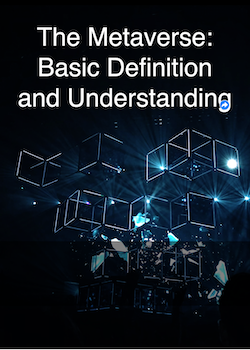 Beginning with this week, I want to run a series of articles for you on the Metaverse. On October 31, 2021 I wrote an article titled “What is the Metaverse and why does it matter?” which you can find at https://realtytechbytes.com/what-is-the-metaverse-and-why-does-it-matter/
Beginning with this week, I want to run a series of articles for you on the Metaverse. On October 31, 2021 I wrote an article titled “What is the Metaverse and why does it matter?” which you can find at https://realtytechbytes.com/what-is-the-metaverse-and-why-does-it-matter/
Then on February27, 2022 I followed up with “What is the metaverse how you use it and why is it important?” which you can find at https://realtytechbytes.com/what-is-the-metaverse-how-you-use-it-and-why-is-it-important/
Over the next six weeks I want to take a deeper dive in to the Metaverse because the more I read about it the more convinced I become that the Metaverse will have an even grater impact on our business than the advent of the Internet and WWW di in the 90s.
I believe that you need to get onboard, and soon!
So This week I will start with “The Metaverse: Basic Definition and Understanding”. Get a coffee or your favorite beverage and settle in for an inserting read!
So, surely by now you’ve heard of this Multiverse thing. But, what exactly is it? Another reality that consumers can escape to, it sounds awfully sci-fi.
The Metaverse is defined as “a simulated digital environment utilizing augmented reality (AR), virtual reality (VR), and blockchain technology – with concepts from social media – to create interactive spaces that mimic the real world”.
But what does that mean? It almost sounds like the Holodeck from Star Trek, doesn’t it? But it really isn’t as complicated or high-tech as all that.
If you’ve seen or read Ready Player One, you’ve got the basic idea. It’s essentially a Virtual Reality technology that users can access using special VR headsets and controllers. At its core, it’s a more immersive and integrated social media experience. However, rather than being a 2D experience, it’s a simulated 3D reality.
Metaverse Origins
The term “Metaverse” may be quite new to some people, but the concept itself has been around for quite some time. In the 1992 novel “Snow Crash” by Neal Stephenson, the concept of a “metaverse” was introduced as a way to escape a futuristic, dystopian society.
Over the past 3 decades, the technological industry has been laying down the foundations for a real life Metaverse, slowly but surely. VR headsets are becoming more commercially available, comfortable, and advanced. The reaches of the internet have spread. Online gaming has become immensely popular, overtaking the once solitary single-player experience almost entirely. All this combined has made it possible and easy to envision a simulated online world, where there even exists digital real estate and tradeable assets. Even sophisticated avatars indiscernible from a real life person can be achieved.
While Facebook, now known as Meta, are fronting this new technological revolution, they’re hardly the first company to explore the concept. The company Decentraland works on the exact same premise as Facebook’s Metaverse, with avatars, a governance system, and a crypto-backed economy.
Who will own and run the Metaverse?
While Mark Zuckerberg of Meta is fronting this project, the Metaverse will be an “embodied internet”. It will be operated by several different decentralized players. This means that Facebook won’t “run” the Metaverse, it’ll be run and operated by users.
What’s next?
There are many skeptics about the efficacy or potential realistic applications of the Metaverse, however as the use of cryptocurrency is growing in pooularity worldwide, and wide-scale multiplayer video game universes like Minecraft have prepped an entire generation of users for intensely immersive experiences, there’s truly nothing stopping such innovation.
We can expect significant growth of this subject in the coming years, as tech grows more and more sophisticated.
Discover more from RealtyTechBytes.com by Jerry Kidd
Subscribe to get the latest posts sent to your email.







